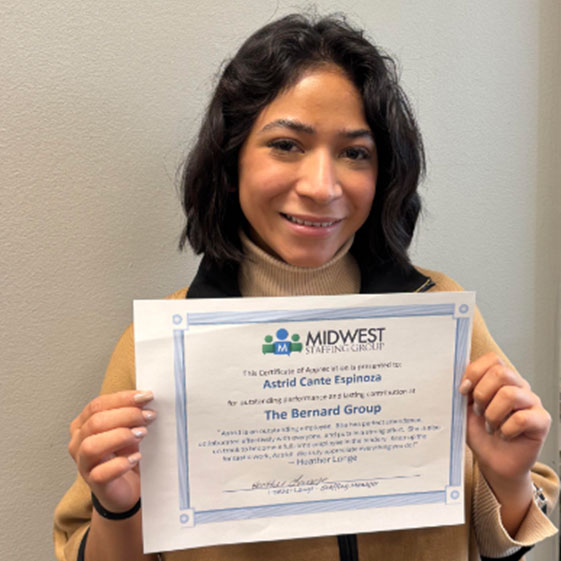If you’re considering temporary work as a stepping stone to permanent employment, you’re not alone—and the data shows you’re making a smart move. A recent survey by the American Staffing Association revealed that nearly 60% of temporary workers successfully transition into permanent positions (American Staffing Association), proving that temp-to-hire opportunities are more than just a foot in the door. At Midwest Staffing, we’ve been connecting job seekers with leading employers across Minnesota and North Dakota since 1990, and we’ve seen firsthand how temporary assignments can launch lasting careers.
For employers, the numbers tell a compelling story too. The median temp-to-perm conversion ratio among large contingent workforce buyers was 10% for North American companies, according to Staffing Industry Analysts (Staffing Industry Analysts)—meaning one in ten temporary workers transitions to a traditional employee role. But that’s just the baseline. With the right staffing partner, the right preparation, and a clear understanding of what employers are looking for, candidates can dramatically improve their chances.
Six in 10 staffing employees (64%) work in the industry to fill in the gap between jobs or to help them land a job (American Staffing Association), making temporary work one of the most strategic paths to full-time employment available today. Whether you’re a job seeker exploring contract-to-hire opportunities in the Twin Cities or Fargo area, or a business considering temp-to-perm hiring to reduce recruitment costs, understanding today’s conversion rate trends can help you make smarter workforce decisions heading into 2026.
Understanding Temp-to-Perm Conversion Rates by the Numbers
Before diving into strategies, let’s look at what the data actually tells us about temp-to-perm conversions in today’s job market.
Key Industry Statistics for 2025-2026
- Nearly 60% of temporary workers successfully transition into permanent positions, according to the American Staffing Association. (American Staffing Association)
- The median conversion ratio among large companies is 10% in North America, 8% in Asia Pacific, and 5% in Europe. (Staffing Industry Analysts)
- Over 70% of employers use temp-to-hire as part of their permanent hiring pipeline, making temporary work a legitimate path to career advancement. (Constellation Search Group)
- 35% of temporary workers are offered permanent positions by their clients, and 66% of those workers accept the offers. (Alliance Employment Services)
- U.S. staffing companies employed 2.2 million temporary and contract workers per week in late 2024, with numbers rebounding in 2025. (American Staffing Association)
These statistics reveal an important truth: temp-to-perm isn’t just possible—it’s increasingly common. For job seekers in the Minneapolis-St. Paul metro area and Fargo region, these numbers represent real opportunities to build long-term careers through strategic temporary placements.
Industries with the Highest Temp-to-Perm Conversion Rates
Not all industries convert temporary workers at the same rate. Understanding which sectors offer the best opportunities can help you focus your job search strategically.
Manufacturing and Production
Manufacturing consistently ranks among the top industries for temp-to-perm conversions. Companies in this sector often use temporary assignments to evaluate workers’ reliability, safety compliance, and production efficiency before extending permanent offers (Contrax Workforce). In the Twin Cities area, where manufacturing remains a cornerstone of the regional economy, skilled production workers who demonstrate consistency and attention to quality are frequently converted to permanent roles.
Warehouse and Logistics
With e-commerce driving unprecedented demand for distribution and fulfillment workers, warehouse and logistics positions offer excellent conversion potential. Employers in this space value dependability and the ability to work efficiently under pressure. Forklift operators, warehouse associates, and quality assurance testers who prove themselves during peak seasons often transition to permanent positions (Constellation Search Group).
Healthcare Support
Healthcare organizations face ongoing staffing challenges and frequently use temp-to-perm arrangements to assess fit before committing to long-term employment (Akraya). Medical administrative assistants, patient intake coordinators, and pharmacy technicians who demonstrate strong communication skills and attention to detail are prime candidates for permanent conversion.
Administrative and Office Support
Office and administrative roles remain strong candidates for temp-to-perm conversion. Companies appreciate the opportunity to evaluate organizational skills, software proficiency, and cultural fit before making permanent hiring decisions. For candidates, these positions offer exposure to company operations and the chance to build relationships across departments (IBISWorld).
7 Proven Strategies to Increase Your Temp-to-Perm Conversion Chances
At Midwest Staffing, we’ve helped thousands of temporary workers transition to permanent employment over our 30+ years in the staffing industry. Here are the strategies that consistently lead to successful conversions:
1. Treat Every Day Like a Working Interview
From day one, approach your temporary assignment as an extended job interview. Hiring managers form lasting impressions within the first 30 days, according to LinkedIn research (Constellation Search Group). Arrive early, dress professionally, and consistently exceed expectations. Every task—no matter how small—is an opportunity to demonstrate your value.
2. Build Reliability as Your Foundation
Dependability ranks higher than innovation for most employers when evaluating temporary workers for permanent positions. A CareerBuilder report found that reliability is one of hiring managers’ top priorities (Constellation Search Group). Show up on time, meet deadlines, and maintain a positive attitude even during challenging moments. Temporary workers who demonstrate resilience and a can-do mindset are viewed as long-term candidates.
3. Actively Seek and Apply Feedback
Research from Harvard Business Review shows that employees who actively request feedback are perceived as more competent and motivated by their supervisors (Constellation Search Group). Don’t just ask “How am I doing?”—ask specific questions like “What could I improve to add more value?” Then demonstrate that you’re applying what you’ve learned.
4. Embrace the Company Culture
The Society for Human Resource Management (SHRM) found that over 80% of recruiters consider cultural fit to be a top factor when deciding on permanent hires (Constellation Search Group). Engage meaningfully with colleagues, participate in team activities, and demonstrate alignment with the company’s values. When people enjoy working with you, they’ll advocate for keeping you around.
5. Go Beyond Your Job Description
Temporary workers who stand out often volunteer to help with additional projects or learn new skills that benefit the team. Cross-training, picking up extra skills like forklift certification, or offering to help during busy periods demonstrates initiative and investment in the company’s success (Spectra360).
6. Communicate Your Interest Clearly
Many temporary workers miss conversion opportunities simply because they never expressed their interest in staying (Monster). After completing a successful milestone, have a thoughtful conversation with your supervisor. Frame it around what you’ve learned, what you’ve enjoyed, and how you see yourself contributing long-term. Ask what specific steps you can take to be considered for a permanent role.
7. Partner Closely with Your Staffing Agency
Your staffing agency is your advocate. Keep your recruiter informed about your performance, goals, and interest in permanent placement (AMPM Employment). At Midwest Staffing, our team maintains close relationships with our client companies and can help advocate for high-performing temporary employees when permanent opportunities arise.
For Employers: Why Temp-to-Perm Hiring Makes Business Sense
If you’re an employer in Minnesota or North Dakota considering temp-to-perm hiring strategies, the data strongly supports this approach as a cost-effective way to build your workforce.
Key Benefits of Temp-to-Perm Hiring
- Reduced Hiring Risk: Evaluate candidates’ actual job performance, cultural fit, and work ethic before committing to permanent employment. (Activated Scale)
- Lower Recruitment Costs: Staffing agencies handle initial screening, background checks, and onboarding, reducing your HR burden. (Activated Scale)
- Faster Time-to-Productivity: Converted employees already understand your processes, systems, and culture, eliminating the learning curve. (Akraya)
- Improved Retention: Workers who transition from temp to permanent roles have already demonstrated commitment and are more likely to stay long-term. (Activated Scale)
- Workforce Flexibility: Scale your team up or down based on business demands while identifying your strongest performers for permanent positions. (Indeed)

Real Success Stories from Midwest Staffing
At Midwest Staffing, we celebrate our employees’ successes. Here are just a few examples of temporary workers who made lasting impressions and earned permanent positions:
- Ana G. made an impressive impact from day one. Within a month, she accepted a team lead role and became one of the best-performing area leaders in production. Her client praised her leadership, communication skills, and pride in quality work. (Midwest Staffing)
- Georgi G. has successfully worked with Midwest Staffing at one client for over 15 years. His supervisor describes him as “a core member of our team” whose work ethic is “second to none.” (Midwest Staffing)
- Larry H. was hired permanently after consistently answering the call whenever help was needed. His client noted his dependability, hard work, and genuine enjoyment of his craft. (Midwest Staffing)
These success stories represent the potential that exists when talented workers partner with the right staffing agency and approach temporary assignments with commitment and professionalism.

What to Expect from the Temp-to-Perm Process
Understanding how temp-to-perm arrangements typically work can help you navigate the process successfully:
- Trial Period: Most temp-to-perm arrangements include a trial period of 60 to 90 days, during which both you and the employer evaluate the fit. (Constellation Search Group)
- Performance Evaluation: Employers assess your reliability, skill development, cultural alignment, and overall contribution to the team. (Activated Scale)
- Conversion Discussion: When you’re offered a permanent position, be prepared to discuss salary expectations and benefits. The permanent role may include health insurance, retirement plans, paid time off, and career advancement opportunities. (Fortune)
- Conversion Fees: Employers typically pay a conversion fee to the staffing agency, calculated as a percentage of your first-year salary (often 10-25%). This is handled between the employer and agency—it doesn’t affect your compensation. (FoxHire)
Start Your Path to Permanent Employment Today
The data is clear: temporary work is one of the most effective pathways to permanent employment in 2026. With the right approach, the right skills, and the right staffing partner, you can dramatically increase your chances of converting a temporary assignment into a lasting career.
At Midwest Staffing Group, we’ve been connecting job seekers with quality employers throughout Minnesota and North Dakota since 1990. Our team understands the local job market, maintains strong relationships with top employers, and is committed to helping you achieve your career goals—whether that’s finding flexible temporary work or transitioning to a permanent position.
Ready to take the next step? Visit our Job Board to explore current opportunities, or apply now to get started with our team. With eight branches across the Twin Cities, Fargo, and surrounding areas, we’re here to help you find your next opportunity.
Contact Midwest Staffing Group
Phone: (651) 641-0442 | Email: service@midweststaffing.com















